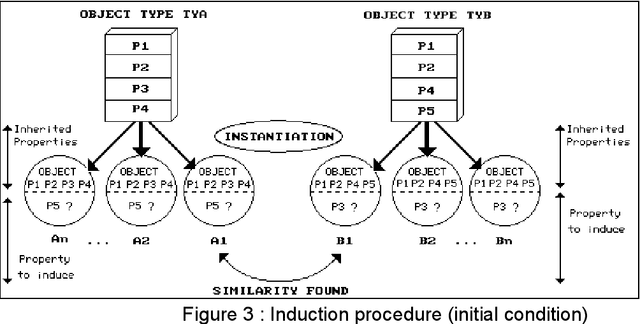Joël Colloc
IDEES
Automatic Knowledge Acquisition for Object-Oriented Expert Systems
May 18, 2020



Abstract:We describe an Object Oriented Model for building Expert Systems. This model and the detection of similarities allow to implement reasoning modes as induction, deduction and simulation. We specially focus on similarity and its use in induction. We propose original algorithms which deal with total and partial structural similitude of objects to facilitate knowledge acquisition.
An Object Model for the Representation of Empirical Knowledge
May 15, 2020Abstract:We are currently designing an object oriented model which describes static and dynamical knowledge in diff{\'e}rent domains. It provides a twin conceptual level. The internal level proposes: the object structure composed of sub-objects hierarchy, structure evolution with dynamical functions, same type objects comparison with evaluation functions. It uses multiple upward inheritance from sub-objects properties to the Object. The external level describes: object environment, it enforces object types and uses external simple inheritance from the type to the sub-types.
A multi-agent ontologies-based clinical decision support system
Jan 21, 2020



Abstract:Clinical decision support systems combine knowledge and data from a variety of sources, represented by quantitative models based on stochastic methods, or qualitative based rather on expert heuristics and deductive reasoning. At the same time, case-based reasoning (CBR) memorizes and returns the experience of solving similar problems. The cooperation of heterogeneous clinical knowledge bases (knowledge objects, semantic distances, evaluation functions, logical rules, databases...) is based on medical ontologies. A multi-agent decision support system (MADSS) enables the integration and cooperation of agents specialized in different fields of knowledge (semiology, pharmacology, clinical cases, etc.). Each specialist agent operates a knowledge base defining the conduct to be maintained in conformity with the state of the art associated with an ontological basis that expresses the semantic relationships between the terms of the domain in question. Our approach is based on the specialization of agents adapted to the knowledge models used during the clinical steps and ontologies. This modular approach is suitable for the realization of MADSS in many areas.
* in French
Perspectives and Ethics of the Autonomous Artificial Thinking Systems
Jan 13, 2020



Abstract:The feasibility of autonomous artificial thinking systems needs to compare the way the human beings acquire their information and develops the thought with the current capacities of the autonomous information systems. Our model uses four hierarchies: the hierarchy of information systems, the cognitive hierarchy, the linguistic hierarchy and the digital informative hierarchy that combines artificial intelligence, the power of computers models, methods and tools to develop autonomous information systems. The question of the capability of autonomous system to provide a form of artificial thought arises with the ethical consequences on the social life and the perspective of transhumanism.
Constructing Ontology-Based Cancer Treatment Decision Support System with Case-Based Reasoning
Dec 05, 2018



Abstract:Decision support is a probabilistic and quantitative method designed for modeling problems in situations with ambiguity. Computer technology can be employed to provide clinical decision support and treatment recommendations. The problem of natural language applications is that they lack formality and the interpretation is not consistent. Conversely, ontologies can capture the intended meaning and specify modeling primitives. Disease Ontology (DO) that pertains to cancer's clinical stages and their corresponding information components is utilized to improve the reasoning ability of a decision support system (DSS). The proposed DSS uses Case-Based Reasoning (CBR) to consider disease manifestations and provides physicians with treatment solutions from similar previous cases for reference. The proposed DSS supports natural language processing (NLP) queries. The DSS obtained 84.63% accuracy in disease classification with the help of the ontology.
 Add to Chrome
Add to Chrome Add to Firefox
Add to Firefox Add to Edge
Add to Edge